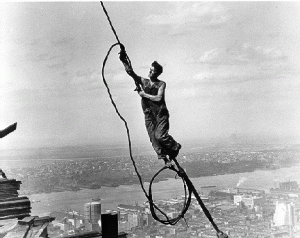
As Dr. Cullinane pointed out, most projects begin with the subject’s birth. Yet his begins when Theodore Roosevelt (TR) passes, on January 6, 1919. At that time, President Woodrow Wilson (a political and personal foe of TRs) was on route to Europe to forge a post-War world. Indeed, when told of the news of TR’s passing, Wilson was said to have underwent an array of emotions before settling on a wide grin, stretching from cheek to cheek. With Wilson’s hesitation to enter the war in the first place, European leaders were cautious of his plans to remake the world through his ‘Fourteen Points.’ Conversely, many of them adored TR.
Not only had TR strongly supported the Allies from the start, repeatedly and angrily denouncing the foreign policy of Wilson in the process, calling it a failure regarding the atrocities in Europe and the violations of American rights, but he also experienced personal sacrifice through the war effort. All four of his sons served with valor, each receiving an array of medals and awards, but TR’s youngest son, Quentin, a pilot with the American forces in France, was shot down behind German lines on July 14, 1918, at the age of 20. This loss deeply affected TR and Europeans were far more sympathetic to TR than they were to Wilson, who had no sons to serve, and had supported the neutrality act. Indeed, the feeling of camaraderie with TR was so strong that Quentin’s grave in Europe became a pilgrimage site of memory/mourning for Europeans grieving the loss of the former President. The British signaled a national day of mourning upon news of TR’s passing, while the French labeled him the ‘Champion of the Entente.’ In fact, most of the eulogizing focused on TR’s fight to get the US into the war from an early stage, instead of his upbringing, presidential terms, or progressive ideals.
This all ensured that a dark cloud of ‘Rooseveltianism’ hung over post-war proceedings in Versailles. The polish of Wilson’s European visit (the first of a sitting US President) wore off quite quickly when contrasted with TR’s memory. Wilson did not visit the battlefields until prompted to and did not consult European powers when crafting the Fourteen Points. As Dr. Cullinane highlighted, David Lloyd George, the British Prime Minister, provides a real insight into this tension though his memoirs, demonstrating how the debates at the time were framed as ‘Wilsonianism’ vs. ‘Rooseveltianism.’ The British Press for example, termed opponents of the Treaty of Versailles as ‘friends or agents of TR.’ Republicans at home also used the memory of TR to cast a shadow over proceedings in Congress, ultimately leading to rejection of the Treaty.
As Dr. Cullinane demonstrated then, the selective process of mourning and use of a pivotal figure to advance ones own cause is not uncommon, but the size of the shadow TR cast over Versailles and the Congressional debates is a fascinating point of history. The War helped to shape TR’s legacy, and how European powers co-opted this legacy for their own campaigns against Wilson’s post-war vision is crucial to our understanding of the eventual outcome. Dr. Cullinane is clearly on to something here and I am intrigued to see how this research develops in the future.
Joe Ryan-Hume
PGR at The University of Glasgow

